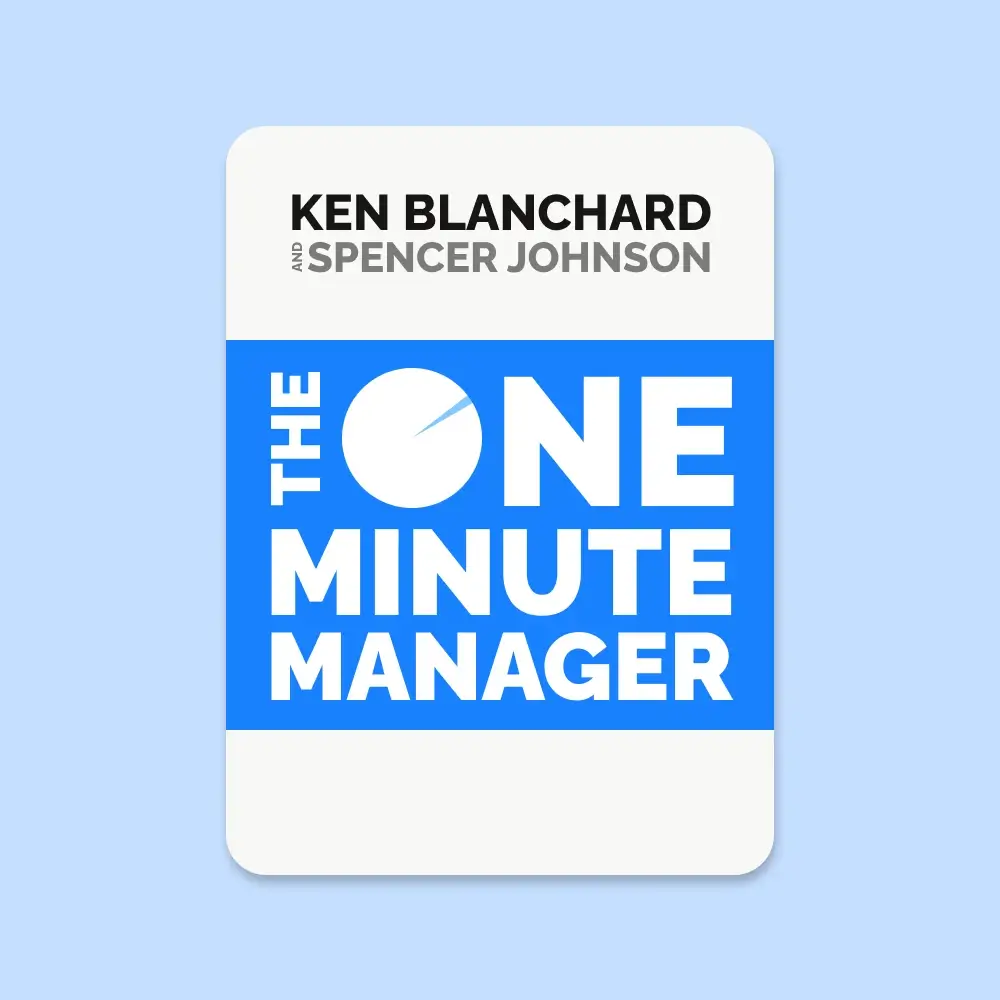
The One Minute Manager
🌟 People Thrive When They Feel Good − Self-esteem drives performance—people who feel good about themselves achieve better results.
🎯 One Minute Goals −
- Plan and define goals clearly together.
- Keep goals brief, written on one page with due dates.
- Review goals daily for alignment and quick corrections.
- Encourage reflection to adjust actions toward goals.
👏 One Minute Praisings −
- Praise immediately and be specific about what was done right.
- Share how their success positively impacts results.
- Let them feel good about their achievement.
- Show confidence and encourage repeat behavior.
⚡ One Minute Re-Directs −
- Address mistakes quickly and specifically.
- Express your feelings about the mistake’s impact.
- Pause to let it sink in.
- Separate the mistake from the person—affirm trust and support.
- Once done, move on—don’t hold grudges.
🧠 People Development Matters − Invest time and resources in developing people, not just paying salaries.
📈 Feedback Is Fuel −
- Frequent, constructive feedback keeps motivation high.
- “Feedback is the breakfast of champions.”
👀 See the Winner in Everyone − Potential often hides behind appearances—treat everyone like a winner.
🔄 Re-Direct, Don’t Punish −
- Correct behavior gently, especially with inexperienced people.
- Focus on behavior, not the person’s worth.
🛤 Mistakes Are Lessons −
- Mistakes are natural; failure to learn from them is the real issue.
- Goals spark behavior; consequences shape future actions.
-
People who feel good about themselves produce good results.
-
A problem only exists if there is a difference between what is actually happening and what you desire to be happening.
-
One minute goals work well when you
-
Plan the goals together and describe them briefly and clearly. Show people what good performance looks like.
-
Have people write out each of their goals, with due dates, on a single page.
-
Ask them to review their most important goals each day, which takes only a few minutes to do.
-
Encourage people to take a minute to look at what they’re doing, and see if their behavior matches their goals.
-
If it doesn’t, encourage them to re-think what they’re doing so they can realize their goals sooner.
-
-
Help people reach their full potential. Catch them doing something right.
-
One Minute Praising works well when you
-
Praise people as soon as possible.
-
Let people know what they did right—be specific.
-
Tell people how good you feel about what they did right, and how it helps.
-
Pause for a moment to allow people time to feel good about what they’ve done.
-
Encourage them to do more of the same.
-
Make it clear you have confidence in them and support their success.
-
-
Praising people doesn’t always work if it isn’t combined with Re-Directs to correct mistakes when they occur.
-
A one minute re-direct works well when you
-
Re-Direct people as soon as possible.
-
Confirm the facts first, and review the mistake together—be specific.
-
Express how you feel about the mistake and its impact on results.
-
Be quiet for a moment to allow people time to feel concerned about what they’ve done.
-
Remember to let them know that they’re better than their mistake, and that you think well of them as a person.
-
Remind them that you have confidence and trust in them, and support their success.
-
Realize that when the Re-Direct is over, it’s over.
-
-
The best minute I spend is the one I invest in people.
-
It’s ironic that most companies spend so much of their money on people’s salaries, and yet they spend only a small fraction of their budget to develop people.
-
The number one motivator of people is feedback on results. They want to know how they’re doing.
-
Feedback Is the Breakfast of Champions. It’s feedback that keeps us going.
-
Everyone is a potential winner. Some people are disguised as losers. Don’t let their appearances fool you.
-
Take a minute to look at your goals. Then look at what you’re doing and see if it matches your goals.
-
Rather than punish inexperienced people who are still learning, we need to re-direct them.
-
It’s not fair to people to save up negative feelings about their poor performance, and it’s not effective.
-
If you are first tough on the behavior, and then supportive of the person, it works better.
-
Tell people what they did wrong; tell them how you feel about it; and remind them they are better than that.
-
We are not just our behavior. We are the person managing our behavior.
-
Making mistakes is not the problem. It’s not learning from them that causes real problems.
-
Goals begin behaviors. Consequences influence future behaviors.
